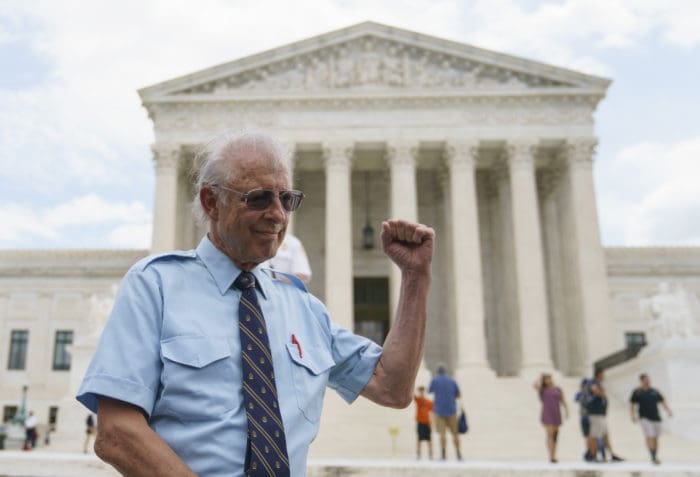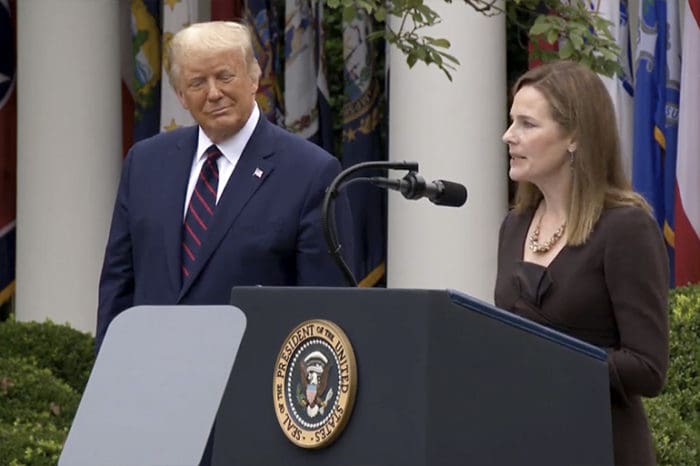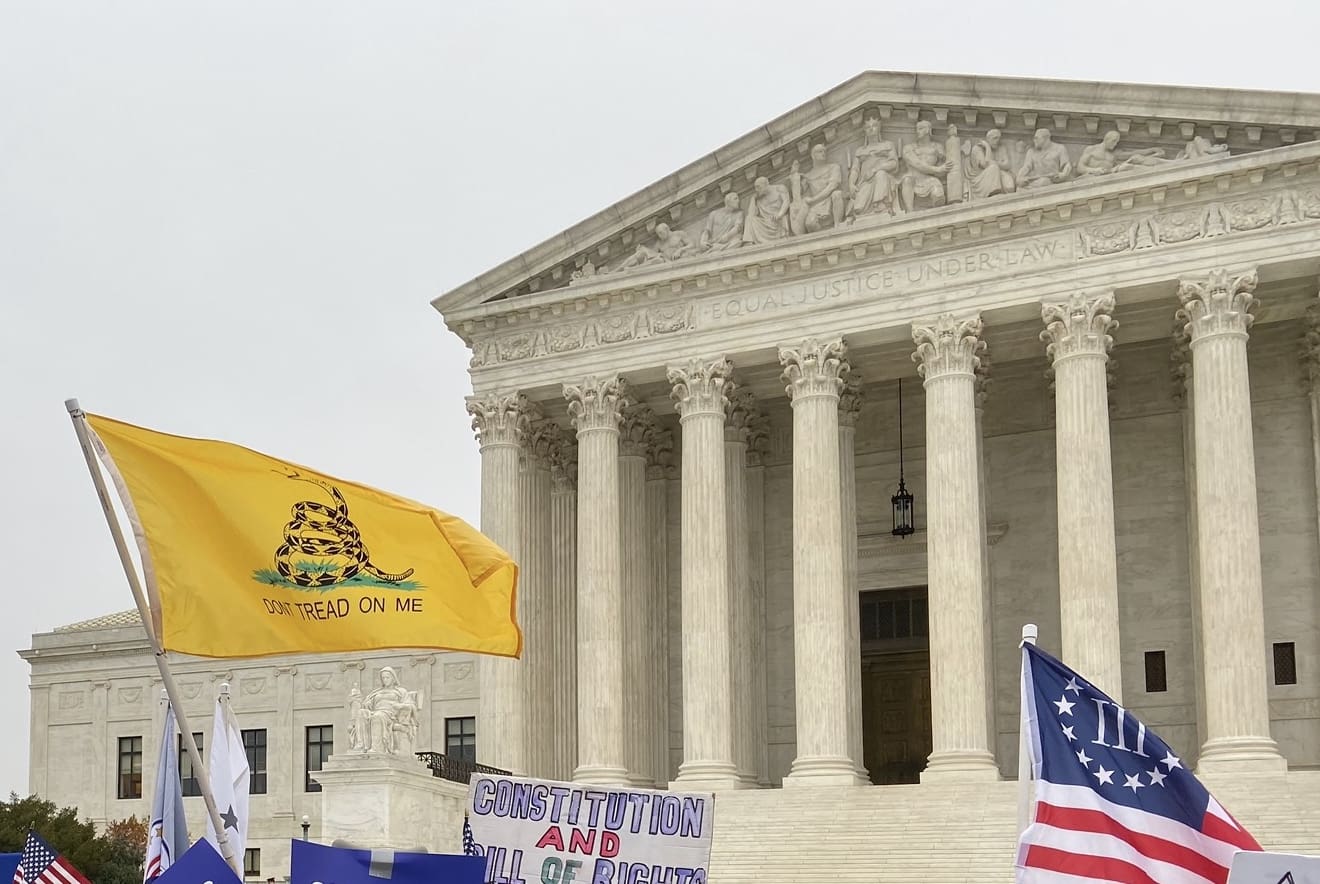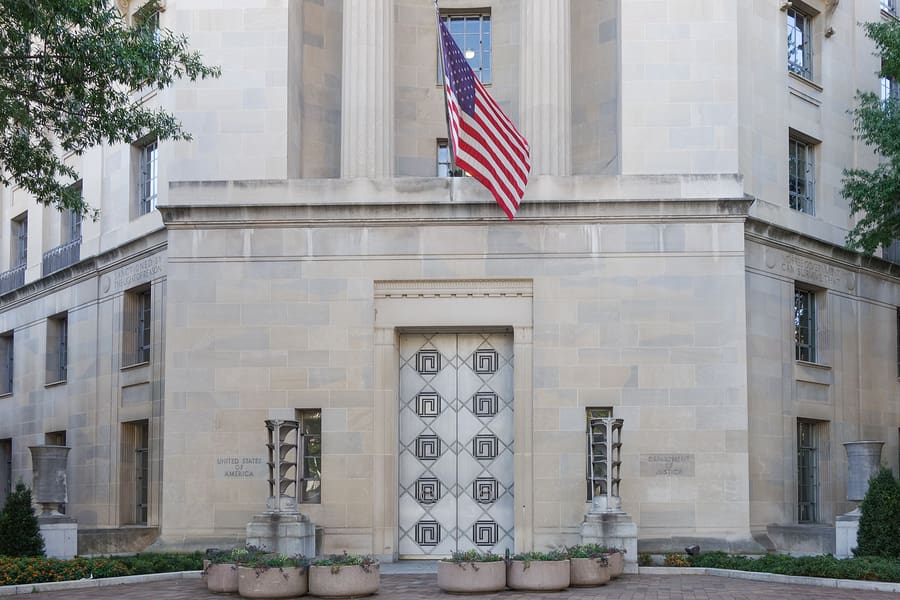By Eric Ruben, Southern Methodist University
The stakes in one of the most significant Second Amendment cases in U.S. history are high.
The Supreme Court’s ruling in New York State Rifle & Pistol Association v. Bruen, expected by mid-2022, could declare a New York state restriction on carrying concealed handguns in public places unconstitutional.
Such a ruling in favor of the plaintiffs, which include a National Rifle Association affiliate, could loosen gun regulations in many parts of the country.
In my view as a Second Amendment scholar, this case is also noteworthy in that how the court reaches its conclusion could affect the Second Amendment analysis of all weapons laws in the future.
The court is set to hear oral arguments on Nov. 3.
Long on the books
In 1911, after an increase in homicides, New York instituted a handgun permitting system. In 1913, the permitting system was amended to address concealed carrying.
For more than a century, someone seeking to carry a concealed handgun for self-defense in the state has needed to file a permit application showing that they have what the law calls “proper cause.”
To obtain an unrestricted permit, applicants must “demonstrate a special need for self-protection distinguishable from that of the general community,” such as by showing they are being stalked.
New York’s attorneys defend this restrictive approach to issuing concealed carry permits as an effective means to reduce gun violence. In 2020, there were 43,592 gun deaths in the United States, including suicides and homicides. There are also over 80,000 non-fatal firearm injuries each year.
New York has some of the strictest gun laws in the country, and its homicide rate is below the national average.
The plaintiffs
Robert Nash and Brandon Koch were denied unrestricted concealed carry permits because a judge determined that they did not satisfy New York’s proper-cause standard.
Instead, Koch was issued a license to carry a concealed handgun for self-defense while traveling to and from work. Both plaintiffs’ licenses also permit them to carry concealed handguns for hunting and target practice, and for self-defense in areas not “frequented by the general public.”
Along with the NRA’s New York affiliate, Nash and Koch contend that these limitations on their ability to carry a concealed handgun violate their right to bear arms. They assert a broad view of the right to carry a handgun, one that extends virtually “whenever and wherever” the need for self-defense might arise.
New York’s law defies that conception of the Second Amendment.
The Heller ruling’s muted effects
In considering Bruen, the Supreme Court will focus on the meaning of an important precedent: District of Columbia v. Heller.
When the Supreme Court issued its Heller ruling in 2008, a 5-4 majority struck down Washington, D.C.‘s ban on the possession of handguns in the home. The court held for the first time that the Second Amendment protects an individual’s right to keep and bear arms.
Writing for the majority, the late Justice Antonin Scalia declared that the “central component” of the Second Amendment was not a “well regulated Militia,” but rather “the inherent right of self-defense.”
But the majority’s decision included cautionary language that lower-court judges have since relied on to uphold gun laws.
“The right secured by the Second Amendment is not unlimited” and is “not a right to keep and carry any weapon whatsoever in any manner whatsoever and for whatever purpose,” Scalia wrote. His opinion even contained a list of “presumptively lawful regulatory measures,” such as restrictions on the possession of firearms by felons or bans on carrying them in sensitive places like schools and government buildings.
The NRA and other gun rights supporters have bristled at the general acceptance by judges of the constitutionality of laws restricting firearm use.
That discontent culminated in Bruen.

More and more states have allowed concealed handguns
In 1980, most Americans lived in places that either banned concealed carry or had a New York-style “proper cause” permitting regime. An NRA push beginning in the late 1980s loosened public carry laws around the country.
In states where gun rights advocates possess relatively little clout, gun rights supporters hope that Bruen will accomplish through the courts what they have failed to accomplish through the political process.
Today, New York is one of eight states requiring that people seeking to carry concealed handguns have a “proper” or “good” cause. California, Delaware, Hawaii, Maryland, Massachusetts, New Jersey and Rhode Island have similar laws on the books.
If the court strikes down New York’s law, Americans in those states could expect an increase in the number of people legally carrying handguns in their communities. Anyone who wants to carry a concealed handgun would have an easier time doing so.
A ‘text, history and tradition test’
Bruen could also be a turning point for how judges evaluate all Second Amendment cases – whether they’re about assault weapons, tasers or felon-in-possession offenses.
Until now, judges have generally assessed whether such restrictions are justified by current public safety concerns.
Many gun rights advocates are asking the Supreme Court to reject that approach. Instead, they want judges to decide cases on the sole basis of history and tradition unless the judiciary’s interpretation of the text of the Second Amendment resolves the issue. This is known as the “text, history and tradition” test.
Justice Brett Kavanaugh is credited with first articulating this test in a dissent he issued prior to his rise to the Supreme Court.
Justices Clarence Thomas, Neil Gorsuch and Amy Coney Barrett all have embraced similar judicial philosophies to some degree.
But there’s a catch: Guns have always been regulated in America.
New York’s regulation has been on the books for over a century and had a legacy that extended back even further.
If the justices abandon a conventional approach for the text, history and tradition test, I would expect a new round of lawsuits over weapons laws that have already survived prior court challenges. Gun rights advocates would likely, for example, sue over restrictions on large-capacity magazines or safe storage requirements in places where those issues have already been resolved.
This litigation would call on judges to rule on the sole basis of a difficult historical exercise: comparing modern laws addressing modern guns and contemporary gun violence to the laws, practices and weapons of a bygone era.
Trump’s justices may tip the scales
The court has three main options.
It could uphold New York’s law. It could strike it down. Or it could find a middle ground, such as issuing a narrow ruling that punts big questions about gun restrictions down the road.

Chief Justice John Roberts has steered his colleagues toward narrow rulings before. But he will hold little sway if the three justices former President Donald Trump appointed team up with Samuel Alito and Clarence Thomas, the court’s two other conservatives, on a far-reaching majority opinion.
Trump conferred with the NRA before nominating Gorsuch, Kavanaugh and Coney Barrett – all of whom received the gun group’s blessing.Chief Justice John Roberts has steered his colleagues toward narrow rulings before. But he will hold little sway if the three justices former President Donald Trump appointed team up with Samuel Alito and Clarence Thomas, the court’s two other conservatives, on a far-reaching majority opinion.
The ruling will underscore the significance of their presence on the court.
![]()
Eric Ruben, Assistant Professor of Law, Southern Methodist University
This article is republished from The Conversation under a Creative Commons license. Read the original article.





“Chief Justice John Roberts has steered his colleagues toward narrow rulings before. But he will hold little sway if the three justices former President Donald Trump appointed team up with Samuel Alito and Clarence Thomas, the court’s two other conservatives, on a far-reaching majority opinion.”
I wish, but I fear not so.
Roberts will vote with the majority, if only to keep the authorship of the opinion for himself. He will water it down as much as he can get away with while holding onto the majority of votes.
“Roberts will vote with the majority, if only to keep the authorship of the opinion for himself.” I agree; this is most likely in the first round.
Then, Roberts will try to write an opinion which the other 5 Justices will argue against. They have the power to refuse to join in the opinion. The 6/3 vote might not hold.
If just one of the 6 withdraws from the majority, Roberts can announce his as the majority opinion. Roberts wins. If as many as two withdraw from the majority, then the liberal wing would win and would write whatever opinion they desire (not likely.)
If the 5 in the 6/3 majority hang-together then it will be Roberts who withdraws from the majority. Thereupon, I think the senior justice in the remaining majority is entitled to assign the job of authorship; Thomas might assign himself the task.
If I’m on the right track here, then the outcome we should pray for is that the 5 hang-together and insist on an opinion which Roberts will not join. To reach this outcome will require a protracted debate/negotiation which ultimately fails. If the opinion is not announced until June, 22, that will be a good omen.
“If the opinion is not announced until June, 22, that will be a good omen.”
I predict it will be the very last decision announced before they recess for the summer.
And I’m praying Thomas is the author…
See the last part of my comment: “He will water it down as much as he can get away with while holding onto the majority of votes.”
That’s my whole point. Roberts will intentionally vote with the majority solely to keep authorship of the opinion. He will then fight the battle with the remaining majority to water it down as far as he can. He won’t get what he wants because he has to keep that majority in place, but mark my words, as long as Roberts is the Chief Justice, Clarence Thomas will never author a 2A opinion. That makes me nauseous, but I’m quite convinced it is true.
They never rule to rectify a situation or it’s root cause . They always rule just a smidget, barely enough to answer the suit but never enough to settle a matter once and for all. Guess it’s a self serving thing.
How would that be self-serving? They are seated for life.
“How would that be self-serving?”
The narrower the rulings, the sooner the broader issue will be back in the courts for more action. It’s “self-serving” the importance of the institution of the Supreme Court, not any one particular justice.
After the fiasco with the court declaring that the states had no standing in what clearly was a specifically called out standing in the constitution regarding the 2020 election, why does anyone think that this court isn’t compromised?
Get real.
NY…more specifically NYC…has always thought of itself as a special enclave where they are free to make up their own rules….
Roberts is going to be the thorn in the butt to watch.
He’s not much of a conservative.
True, he isn’t.
In our favor, he won’t be required to get a decision we find acceptable.
And, Young v. Hawaii hasn’t been denied cert. yet.
It’s possible the decision we get in this round may just be the tee-up for the next term…
That article was poorly written, disjointed, and highly biased.
How abut a GoFundMe account to send Roberts to “Scailia’s” former hunting ranch in West Texas…..
SCOTUS won’t do anything. Gorsuch, Kavanaugh, and Barrett have shown no moral courage since they took the bench and they seem to be following Roberts down the Souter path.
The Establishment ruling class has nothing but contempt for the 2nd Amendment.
Ticked Off,
Many people have expressed the same sentiment. The Court’s ruling on this case will finally confirm or discount that sentiment once and for all.
I think there is a good chance there will be a positive outcome with a 6-3 or 5-4 decision. I don’t think the timing could be better and doubt the chances will be any better in the forseaable future if ever again. Hoping a decision that will require “strict scrutiny” of future Second Amendment cases. At the very least we will find out where the Justices currently stand on the Second Amendment for better or worse. It will be interestng to see how the democrats threaten the Supreme Court Justices this time as they seem to have gotten their way in the last NYC case but that was before ACB was a Justice.
“Trump conferred with the NRA before nominating Gorsuch, Kavanaugh and Coney Barrett – all of whom received the gun group’s blessing.”
That doesn’t exactly inspire confidence. In fact, given their backhanded support for the Second Amendment, it inspires fear. How will the NRA stab us in the back this time?
I understand your concern and skepticism but what do you propose be done? Just wait and hope things get better? The very fact that they decided to hear the case gives me some confidence as they refused to do so after Roberts deep sixed the last NYC case as “moot” which interestingly Gorsuch strongly disagreed with. Now with ACB as a Justice they have decided to take this case which might mean they talk aming themselves and feel more confident with a favorable ruling this time.
There are indications that they all are pro Second Amendment.
Barrett:
https://www.nationalreview.com/bench-memos/judge-barrett-on-the-second-amendment/
“Judge Amy Coney Barrett’s impressive dissent in Kanter v. Barr (pp. 27-64) illustrates both her fidelity to the Supreme Court’s landmark Second Amendment ruling in District of Columbia v. Heller (2008) and her masterful application of the constitutional methodology of originalism.”
Kavanaugh:
https://freebeacon.com/issues/brett-kavanaughs-view-second-amendment/
Kavanaugh, however, dissented from the majority and agreed with Heller.
“In my judgment, both D.C.’s ban on semiautomatic rifles and its gun registration requirement are unconstitutional under Heller,” he wrote. “In Heller, the Supreme Court held that handguns—the vast majority of which today are semiautomatic—are constitutionally protected because they have not traditionally been banned and are in common use by law-abiding citizens. There is no meaningful or persuasive constitutional distinction between semiautomatic handguns and semiautomatic rifles. Semiautomatic rifles, like semiautomatic handguns, have not traditionally been banned and are in common use by law-abiding citizens for self-defense in the home, hunting, and other lawful uses.”
Gorsuch:
“The National Rifle Association notes favorably a 2012 case in which Gorsuch wrote for the 10th U.S. Circuit Court of Appeals that “the Supreme Court has held the Second Amendment protects an individual’s right to own firearms and may not be infringed lightly.”
Taken with his conservative leanings, originalist views on interpreting the Constitution and comparisons to the late Justice Antonin Scalia, that leads many gun owners to believe Gorsuch would protect their interests.”
https://abcnews.go.com/Politics/supreme-court-weighs-dismissal-york-gun-rights-case/story?id=67435712
Justices Neil Gorsuch criticized New York for what he said was an attempt to evade the Supreme Court review by repealing the contested law after the justices agreed to hear the appeal.
“There were “Herculean, late-breaking efforts to moot the case,” Gorsuch said.”
At this point I don’t know that anything can be done. I can hope for a good outcome, but they have already punted on the most important Rule of Law cases that I’m aware of. I’m not holding my breath.
“…they have already punted on the most important Rule of Law cases that I’m aware of”
Anyone have information of any SC justice whose mind was changed by oral arguments?
Rest easy, these three Trump appointees have been approved by Wayne Lapierre so you can count on their integrity and honesty, just like Wayne Himself…
Bark, bark, says the sea lion.
Bark bark bark, that’s all I do!
And I dig chicks chicks chicks!
They could have taken vote fraud cases too, but wimped out there.
I count on NOTHING from SCOTUS!
Punting is their standard procedure.
The more I see Judges, politicians, and bureaucrats twist different laws into something totally unrecognizable, the less faith I have that they will look at the 2nd Amendment and decide that it means what it clearly says.
“. . . for self-defense in areas not ‘frequented by the general public.’ ” This phrase puzzles me. Likewise, the practice of issuing permits to men-of-means and to couriers of valuables (armored car drivers and diamond merchants).
So, suppose a hiker in the forest; a place not frequented by the general public. He has the right to self-defense against a bear attack. Still, he is more likely to cross paths with another hiker than a bear. Admittedly, the forest is indisputably not frequented by the general public.
So, what is the distinguishing feature of this rule? Is it self-defense in case of confrontation? Or, the probability of confrontation with another human? What in the 2A implies that the power to perceive such a distinction in regulating for public safety?
In the last 30 years I have lived in bear country. In NJ, 20 miles from Manhattan Island. In PA, 2 miles from the NJ line. Whenever on-foot in the streets outside my homes I have had a risk of confrontation with a bear. The risk has been, admittedly, remote but never zero. In any case, my risk of confrontation with a violent criminal has always been greater than with a bear. A mentally-ill drug dealer killed four of his customers two miles from my PA home. A fugitive sex offender was at large for days hundreds of yards from my PA home.
How is it that the NJ or NY legislature can extend the privilege of self-defense in, say, bear country but not in criminal country?
At the same time, men-of-means and couriers of valuable property are given carry permits in NY and NJ. Men-of-means don’t leave home without their American Express cards; they don’t carry cash or Rolex watches (now that cell phones tell the time). Armored car drivers and diamond merchants claim anticipation of confrontation. But, let’s drill into this further.
The right of self-defense has largely been whittled-down to defense of person BUT NOT OF PROPERTY. The courier SHOULD simply give-up his valuable property to an armed robber who can reasonably be expected to refrain from shooting the courier. (Such a robber is, after all, a professional who should behave rationally.) The courier is merely boot-strapping a claim of defense-of-person as a pretext to protect his employer’s property. The man-of-means (sans Rolex) is merely protecting his person.
In both these cases (man-of-means and courier), they carry in ‘frequented by the general public.’ Precisely where errant shots will be likely to strike innocent bystanders. Precisely where such licensees are apt to cross paths with others with whom they have some quarrel. If public safety were the genuine concern of legislators designing gun-carry regulatory schemes, it would be precisely these people who should be CONSTRAINED from carrying firearms in ‘frequented by the general public.’ I really doubt that The Donald or the average courier can shoot as well as I can. But, ability to put shots on target isn’t even being discussed in this debate.
I think SCOTUS and the amici will have to address and resolve these troublesome inconsistencies to dispose of NYSR&PA v Bruen.
I wonder if there’s a strategy here in play we’re not aware of.
It’s possible we get a decision that on the surface looks like weak sauce, but lays a legal foundation for better decisions in future terms.
Then again, maybe I picked a bad day to quit main-lining heroin…
You have more to fear from a rabid raccoon or somebody’s pit bull mix or psychotic cocker spaniel than a bear.
MarkPA,
First of all, you are assuming that the New York City and State politicians had noble intentions–that is a mistake. The primary interest of the Ruling Class is the Ruling Class even if advancing their interests comes at a great expense to the Working Class. Thus, all the Ruling Class does is dream up some claim of legitimacy which seems official enough to pacify the Working Class.
With respect to New York’s firearm laws:
Their justification of their laws is an exceedingly simple “rational basis”: fewer firearms “on the streets” = fewer firearm injuries and deaths. Since the “rational basis” standard only requires that a justification be plausible–and the justification for New York’s laws is indeed plausible–the courts have upheld New York’s laws without any further analysis or proof required.
Of course New York’s firearm laws clearly violate Natural Law–self-defense and the right to life in this case–which means they are unjust and should not stand. So New York invokes the magic incantations “compelling government interest” and “public safety” as somehow overriding Natural Law.
Thus, New York claims that their firearm laws should stand since they satisfy a “rational basis” review in order to advance a “compelling government interest” and “public safety”. Pointing out logical inconsistencies does not matter.
The Sullivan Act was the work of a syphilitic child predator worried about armed Italian immigrants.
As usual gun (arms) control is rooted in racism and ethnic discrimination. A hundred years of racist gun control does not persuade me.
MarkPA,
Continuing on my previous comment, I personally believe that the plaintiffs should not argue over the claim that “fewer firearms on the streets = fewer firearm injuries and deaths”.
I believe that the plaintiffs should argue that “compelling government interests” and “public safety” cannot override Natural Law nor Constitutionally enumerated rights. In other words the plaintiffs should argue that government cannot enact “prior restraint” laws which violate Natural Law and our inalienable rights. Otherwise, government could justify outlawing all manner of things that should not be outlawed.
Example: if violent criminal gangs and arsonists used feminine products to start 200,000 fires annually, would government have legitimate authority to outlaw feminine products? After all, it passes a “rational basis” review standard that outlawing them would reduce arson fires. And it would advance a compelling government interest and public safety. The answer is an emphatic, “NO!” Government would not have legitimate authority to ban feminine products.
The plaintiffs and the U.S. Supreme Court have a ginormous opportunity here to nullify prior-restraint laws (e.g. laws based on claims of social utility) which violate fundamental, inalienable rights and human dignity.
Mark, I have several arguments with your post, but I’ll just make do with this one. Your right to self defense is to protect your person, not your property. That is true, but it does not mean you have to hand over your Rolex when ordered to. I intend to refuse to do so. If the miscreant in question then threatens to cause me bodily harm as a result, I will need to protect my person by shooting him several times.
To crudely put this in perspective:
If a frog had wings, it wouldn’t have to bump its ass on the ground to travel.
I trust none of the Justices except Thomas. He’s the firebrand and the strongest 2A advocate. If he writes the majority opinion, we are golden. Otherwise, win or lose, we will end up stabbed in the back.
One reason that 2A was adopted was to enable us to protect ourselves from our government, which explains why the G has hated 2A for so long. SCOTUS is very much a part of that government, which is why SCOTUS cannot be trusted. When push comes to shove, SCOTUS’ instinct will be to protect the government, not us.
It would be a huge win if SCOTUS rules that firearm laws must pass the “sctrict scrutiny” test.
This would invalidate many assault rifle and magazine capacity bans
“This would invalidate many assault rifle and magazine capacity bans”
Not really sure about this.
At worst, lower courts would simply continue to ignore SC rulings.
At best, such a decision would only reset the game clock, and provide an avenue for lawyers to get rich. Once such a decision is lodged, anti-gun governments would also ignore the ruling, waiting on 2A advocates to sue again, whereupon the governments would have opportunity to “prove” strict scrutiny was applied. This would result in the infringements remaining in place until challenged again at the SC. And then the beat goes on.
“La de da de de, la de da de da”
Yep, the blue states will just ignore a pro-2A ruling. It’s not like SCOTUS has an infantry division to enforce their rulings. The only SCOTUS rulings enforced by the Deep State DOJ are leftist rulings.
All scotus has to do is issue a contempt of court order and send out the US Marshal’s.
That is within their authority.
Now, will they use that authority?
that’s not what happens if a lower state court ignores the SCOTUS.
state courts can ignore SCOTUS if they wish for their own rulings in context with state law if those states laws have not been previously ruled unconstitutional by SCOTUS or a federal court and SCOTUS has not yet heard the case and ruled on it contrary to a state court decision. SCOTUS like all courts can not issue contempt if they have no jurisdiction over a case by first hearing the individual case.
Did ya really think they were going to roll over like the states did with “Roe v. Wade”? Of course it requires more work against recalcitrant states.
The more suits there are, and lose, the wider the precedent and guidance that is in writing. Gradually tying the hand of governments outside the Federal law.
SCOTUS has been doing this for decades to unions. In Bush 1’s time they issued the “Beck Decision”. Union members must be able to be refunded the money for political activity for issues not a union issue.
Bush 1 never touched it. Of course Clinton (Bill) never did a damn thing with it. Other cases have now been ruled on. Recently they ruled that people can “Opt Out’ of bargaining units, and not pay dues.
Of course union members rarely do this. They are afraid of retaliation/firing for ‘unrelated issues” from the lawsuit because their name is on it. It’s 30 plus years out from Beck, and unions keep losing. Only the fear of their members keeps it going. eventually the court will slap them so hard they become a tiny joke in America.
Gun people won’t lay around and accept a ruling that is a state can do what it likes. Eventually SCOTUS will accept a case, and the ruling may slowly undermine state regulation of guns.
Getting gun carry wasn’t a court decision only. Florida led the way, some court accepted their “Shall Issue” system, and it spread.
Don’t expect a “Roe Vs. Wade” sea change ever again. All Justices (Except the ones who issued it.) agree it was a mistake, too wide, and forced an issue the states were slowly resolving themselves. So they’re won’t be a “Day it all changed!” moment on guns.
Slowly but surely attacking the weak points of gun control, undermining the entire structure. patience, and lawyers my friend. Also keep the LaPierre NRA out of it. Their business model is the more “threat” to guns, the more money we make. Not winning cases and going back to safety courses and running competitions.
That doesn’t keep millions in donations flowing in, so Wayne and his buddies skim off the top, and do little but talk anymore.
Once again, which Supreme Court ruling do we go with. The one in 1821 or the one in 2021.
The Right to Bear Arms Shall Not Be INFRINGED.
and the sox may beat the astros.
as srtrych has stated, any conservative findings will be perceived as overreach and become cause for court packing.
Supreme Court Justices belong to the group most of us know as the Elites. The Elites will never allow the rest of us to exist on their plane of existence. Especially with guns. They will continue to chip away at the 2nd amendment.
I would give it less than a 50/50 chance the gun hating Supreme Court will rule in favor of gun owners. And from reading some of the other comments on this forum I am not alone in this viewpoint.
Remember folks. Do not engage with lil’d. He’s proven himself to be mentally ill.
“New York’s regulation has been on the books for over a century….”
How long has 2A been on the books? Does a garbage-city’s local ordinance carry more weight than our constitution?
Guess so.
As I have said for years, if you are relying on SCOTUS for firearms law (or any other law) it’s already to late. Barrett, Kavanaugh, Gorsuch and Roberts are all spineless weasels. Might as well call all four Souter.
Lol. “Trump’s justices” have been doing a bang up job on gun rights cases so far. I, truly, don’t expect things to change on that front.
Hey Guys, i’m making $4000 per month with this awesome home based system, enough for me to make a living.
You don’t need to invest anything, It’s totally FREE! you just have to download it, here’s the link… http://www.jobs70.com
essay代写 7
Comments are closed.